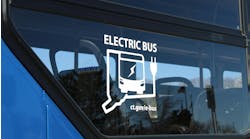The National Transit Institute (NTI) presented its 2017 Model Program Award to Metro Transit Technician Training Program, Metro Transit, Minneapolis, Minnesota.
In an effort to bridge the workforce gap being created by retiring technicians, an expanding fleet and an urgent need for skilled workers at a time where interest in technician careers is declining, Metro Transit and partners developed the Metro Transit Technician Program. This innovative program puts job seekers with little or no experience on a path toward full-time technician roles in bus and rail maintenance by four distinct phases:
- Outreach and assessment
- Personal empowerment training
- Customized training and a paid internship
- A two-year associates degree program for participants, with the program covering all tuition costs not covered by Federal student aid
The program was developed and promoted in partnership with the Amalgamated Transit Union-Local 1005, Twin Cities R!SE and Hennepin Technical College. Funding for the first class of participants came in part from the Federal Transit Administration; a second class is being supported in part with state funding intended to address racial
economic disparities.
In August 2016, 19 participants pursuing careers in bus maintenance successfully completed Metro Transit’s customized training program and their part-time internships. In fall 2016, these participants began a technician degree program at Hennepin Technical College. Participants will be eligible to apply for full-time roles at Metro Transit as early as 2018.
In December 2016, a group of 40 participants pursuing careers in rail maintenance began empowerment training with Twin Cities R!SE, a local non-profit that helps individuals experiencing poverty access meaningful employment opportunities. Candidates who complete all phases of the program will be eligible to apply for full-time positions as electro-mechanic or signals technicians as early as 2019.
In addition to addressing hiring needs, the programs support Metro Transit’s commitment to workforce diversity and equity, which the organization defines as fair and just access to opportunity. Among the 59 participants who have either enrolled and advanced to bus maintenance internships or just entered the rail technician training program there were 42 people of color. The programs have also attracted six female participants. All participants earned less than $25,000 in 2015 and about half had no post-secondary education.
Metro Transit is excited to share its experience with industry peers so that proven workforce development tactics can be used as a model for transit agencies across the country. Their success and proven investment in their employees and their training is what makes the Metro Transit Technician Training Program a Model Program.
The National Transit Institute was created by Congress and receives funding from the Federal Transit Administration to develop, promote, and deliver training and education programs for the public transit industry. NTI’s mission is to provide training and educational resources in support of public transportation and quality of life in the United States.

